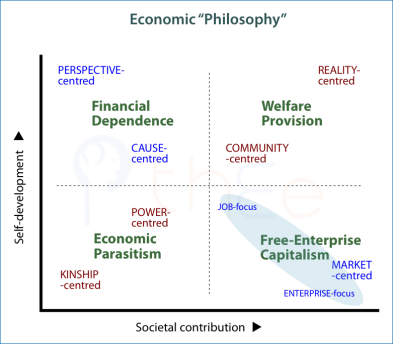Money and Work
Money and prosperity are, or should be, significant pre-occupations for everyone. Money is primarily obtained through work. Irrespective of money, everyone needs to work to keep in contact with themselves, others and social realities (even if only indirectly).
The different orientations to money provide a stark sense of the differences between the .
«» Quadrant
-centred individuals are the embodiment of «free-enterprise capitalism». They value money greatly and tie wealth directly to being competitive and working hard.
«» Quadrant

-centred individuals apply money to their cause: either directly through enabling transfers, or indirectly through their own unpaid cause-related activities. They freely solicit funds from businesses, governments and the-man-in-the-street.
-centred individuals take a balanced view of money and do not give it pre-eminence. In analyses, they seek value for money and cost-effectiveness.
«Economic Parasitism» Quadrant
Kinship-centred individuals view money and work as a necessary part of surviving. A family business can engender intense efforts, but work done for outsiders is performed more perfunctorily. However, living off an inheritance or off welfare benefits are also acceptable modes of coping.
Power-centred individuals see money as ideal for domination and self-gratification. Although riches are highly desired, work itself is less appreciated. Wealth is obtained by working the system: via subsidies and tax breaks, powerful connections, or inside information cf. «Big» business and investment banks that operate hand-in-glove with government.
«Welfare Provision» Quadrant
Community-centred individuals are preoccupied with the use of money to meet the needs of others and seek funds for worthwhile social projects. They hold that inequalities should be reduced by tax-based re-distribution and charitable giving. Such people gravitate to the helping professions, often in the public sector or in service-oriented voluntary organizations.
Reality-centred individuals recognize money’s role in the social system and the need for a safety net for all. Unprejudiced observation reveals that benefits often cause the harm they are seeking to relieve and that governmental costs blow out due to incompetence, corruption and the creation of moral hazards like dependency and free-riding.
-
Return to the overview of support for business and markets.
Originally posted: July 2009